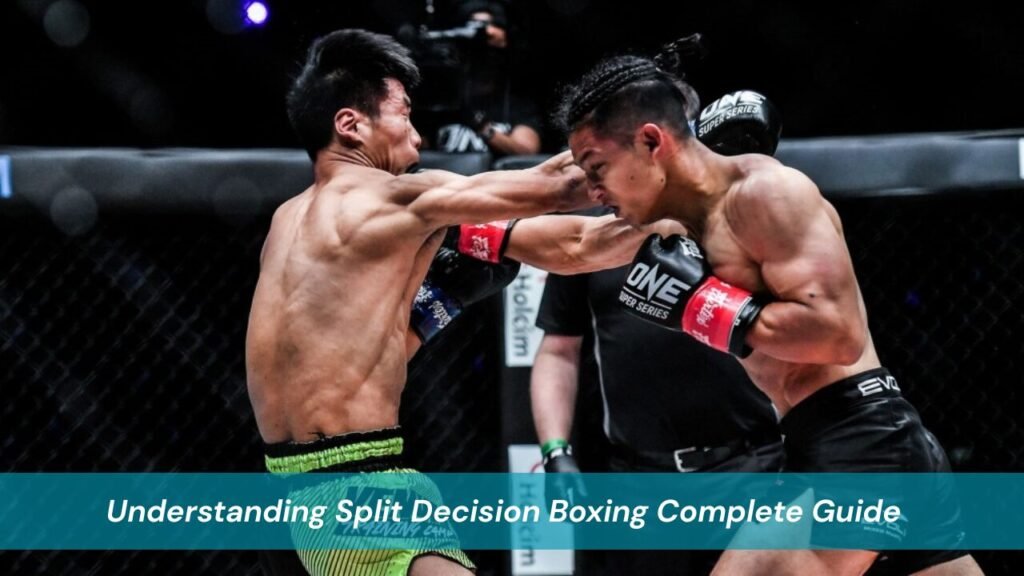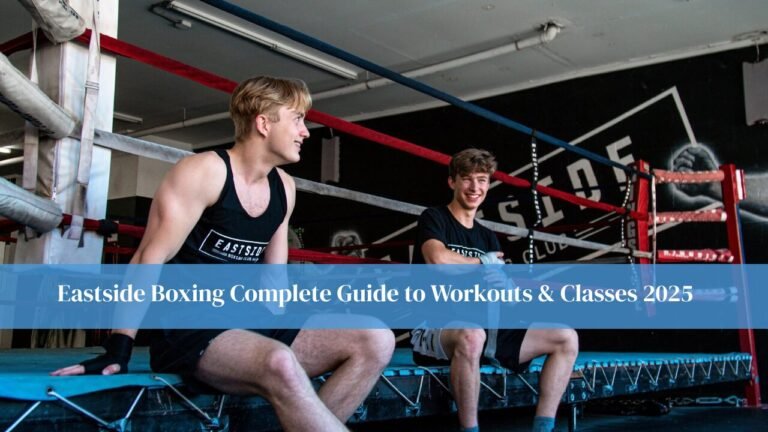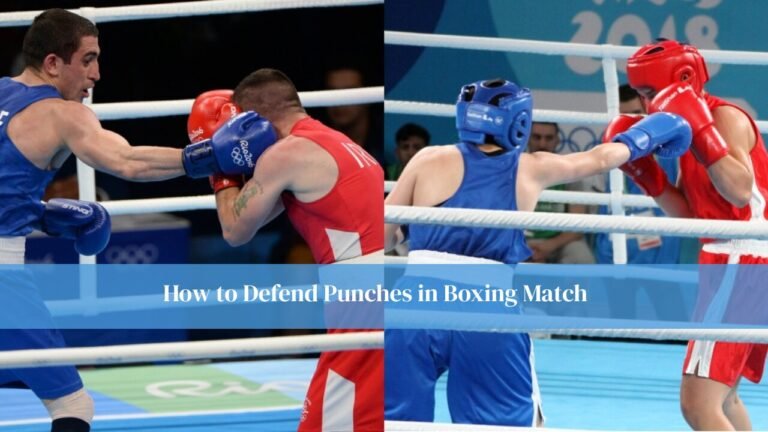Boxing has always been a sport that thrives on drama, intensity, and debate. Fans love the knockouts, the technical skill, and the heart displayed by fighters. But some of the most heated discussions in the boxing community don’t come from clean knockouts, they come from the judges’ scorecards. Among the different types of decisions that can determine the outcome of a fight, one of the most debated is the split decision.
At first glance, a split decision may seem straightforward: two judges side with one fighter, while the third favors the opponent. However, when you start understanding split decision boxing, it becomes clear that this outcome is far more than just numbers on a card. It reflects the subjective nature of scoring, the razor-thin margins of elite competition, and the way a single decision can alter the course of a fighter’s career.
Key Takeaways
- A split decision occurs when two judges favor one boxer while the third favors the opponent.
- It reflects the subjective nature of judging, close competition, and differing scoring criteria.
- Split decisions often spark controversy, debates, and sometimes calls for rematches.
- They impact fighters’ careers, rankings, reputations, and promotional opportunities.
What Is a Split Decision in Boxing?
A split decision happens when two out of the three judges score the bout in favor of one boxer, while the remaining judge believes the other fighter did enough to win. The fighter who receives two favorable scorecards is declared the official winner.
For example, imagine a twelve-round fight where Judge A scores it 116–112 for Fighter A, Judge B scores it 115–113 for Fighter A, and Judge C gives it 115–113 to Fighter B. Even though one judge disagreed, the result is recorded as a victory for Fighter A by split decision.
This type of outcome sends a clear message: the fight was close, competitive, and left room for disagreement. Unlike a unanimous decision, where all judges agree on the winner, a split decision highlights the difficulty of determining superiority when fighters are evenly matched.
Why Split Decisions Happen
To truly appreciate understanding split decision boxing, you need to explore the reasons why judges often see fights differently. One of the most common reasons is that many rounds are simply too close to call. Both fighters might land a similar number of punches, defend well, and control the pace at different times, leaving room for interpretation.
Judging styles also play a major role. Some judges are more impressed by aggression, believing that the boxer moving forward and dictating the fight deserves the round. Others place greater emphasis on clean, effective punching and defense, rewarding fighters who make their opponent miss and then counter effectively. These differences in philosophy can easily lead to split opinions on who controlled the action.
Another factor is human error or bias. While most judges aim to remain impartial, it’s impossible to ignore the fact that mistakes can be made. A judge might be positioned in a way that obstructs their view of certain punches landing, or they might unconsciously favor the more popular fighter. Even crowd noise can influence perception; when fans roar after a punch, it can make it seem more effective than it actually was.
Together, these elements explain why boxing often produces split decisions, leaving fighters, fans, and analysts debating long after the final bell.
Split Decision vs. Other Outcomes
Split decisions are just one possible result in professional boxing, and comparing them to other outcomes helps clarify their significance. When a unanimous decision is announced, it means that all three judges agree on the winner. This outcome carries a sense of authority and leaves little doubt about who deserved the victory. By contrast, a majority decision occurs when two judges select the same fighter as the winner, while the third judge scores the bout as a draw.
Draws are another possibility, and they can take different forms such as a majority draw, split draw, or unanimous draw. Each one has its own implications, but they all reflect the idea that the judges could not agree on a definitive winner. In this context, a split decision sits somewhere between a unanimous decision and a draw: it acknowledges that one fighter edged out the other, but it also admits that the result was far from obvious.
This middle ground is precisely why split decisions carry such weight. They confirm victory but leave a shadow of doubt, creating space for controversy and debate.
Famous Split Decisions in Boxing History
History is filled with examples of split decisions that shaped careers and ignited heated discussions among fans and analysts. One of the most iconic was the 1987 clash between Sugar Ray Leonard and Marvin Hagler. Leonard was awarded the victory by split decision, but many believed Hagler had done enough to win. Decades later, the fight is still dissected in debates about fairness and judging criteria.
Another notable instance came in 1999 when Oscar De La Hoya faced Félix Trinidad. Although De La Hoya lost by majority decision rather than a split, the controversy surrounding the scoring was reminiscent of what happens in split decisions, with fans feeling the outcome did not reflect the action inside the ring. More recently, the 2017 showdown between Canelo Álvarez and Gennady Golovkin ended in a draw, but the razor-thin margins and differing scorecards left many feeling it could just as easily have been a split decision victory for either fighter.
These examples illustrate how powerful split decisions can be in shaping narratives. They not only determine winners and losers but also fuel conversations that last for years, sometimes even overshadowing knockouts and dominant victories.
The Impact of Split Decisions on Fighters
For the winner of a split decision, the result brings both validation and skepticism. On paper, the fighter earns the victory, which boosts their rankings, record, and potential for bigger paydays. However, critics often question whether the win was legitimate, especially if the scoring appeared controversial. This can create pressure on the fighter to prove themselves in future bouts.
For the fighter on the losing end, a split decision can be a bittersweet pill. While a loss goes on their record, the closeness of the fight often preserves their reputation. Many fans and analysts will argue that the defeated fighter actually deserved the victory, which can lead to calls for a rematch.
From a promotional standpoint, split decisions are a double-edged sword. They can spark controversy and frustration, but they also generate buzz. Fans love to debate close fights, and promoters know that controversy sells. Often, a split decision sets the stage for a lucrative rematch, keeping both fighters relevant and drawing more attention to the sport.
How Judges Score Boxing
To understand why split decisions occur so frequently, it’s essential to know how judges are instructed to score fights. Most professional bouts use the 10-Point Must System, where the winner of each round must receive ten points while the loser receives nine or fewer. A knockdown usually results in a 10–8 round, and multiple knockdowns or complete dominance can widen the margin further.
Judges are asked to base their scores on four key criteria: clean punching, effective aggression, ring generalship, and defense. Clean punching refers to the ability to land accurate and effective blows. Effective aggression rewards fighters who attack in a way that produces results, not just those who come forward without landing clean shots. Ring generalship involves controlling the pace and style of the fight, dictating where and how the action unfolds. Finally, defense evaluates a fighter’s ability to avoid punches and minimize damage.
These criteria, while standardized, leave plenty of room for subjectivity. Two judges may watch the same round but prioritize different elements, leading to vastly different scores. This explains why split decisions are not just common, but almost inevitable in a sport as complex and nuanced as boxing.
Are Split Decisions Good or Bad for Boxing?
The question of whether split decisions are good or bad for boxing is one that divides fans and experts. On one hand, split decisions showcase how competitive the sport can be. They remind audiences that at the highest level, fights are often decided by the smallest margins, keeping the sport unpredictable and exciting.
On the other hand, split decisions often breed controversy. When fans believe a fighter was “robbed,” it can undermine trust in the sport’s integrity. Accusations of corruption or incompetence are common after contentious decisions, damaging boxing’s credibility. Yet, paradoxically, these very controversies keep fans engaged. The debates, the rematches, and the drama all contribute to boxing’s unique place in sports culture.
Ultimately, split decisions are a double-edged sword. They reflect the subjectivity of judging but also create the kind of stories and rivalries that make boxing unforgettable.
Split Decisions in MMA Compared to Boxing
Although this article focuses on boxing, it’s worth noting that mixed martial arts (MMA) also uses split decisions. Like boxing, MMA matches are scored round by round, and the same differences in judging criteria can lead to split outcomes. However, MMA introduces additional complexities since judges must also evaluate grappling, takedowns, and control on the ground. This makes MMA split decisions even more subjective than those in boxing, though the debates they spark are just as passionate.
FAQs
What does a Understanding Split Decision Boxing?
A split decision means that two judges scored the fight for one boxer, while the third judge believed the other fighter won. The boxer with two favorable scorecards is declared the official winner.
Is a split decision still a win?
Yes. A split decision is just as valid as a unanimous decision or knockout in terms of a fighter’s record. However, it often carries a sense of controversy that can affect how fans perceive the result.
Which is better, split decision or unanimous decision?
From a fighter’s perspective, both count as victories. However, a unanimous decision demonstrates a clearer level of dominance, while a split decision suggests the fight was extremely close and open to debate.
Can a title change hands on a split decision?
Yes. If a challenger wins a title fight by split decision, they are crowned the new champion. The scoring method does not diminish the legitimacy of the victory.
Why are split decisions so controversial?
Split decisions are controversial because they highlight how differently judges interpret the same fight. Fans often disagree with the official outcome, leading to claims of bias, incompetence, or even corruption.
Conclusion
When it comes to understanding split decision boxing, the key takeaway is that these outcomes are an unavoidable part of the sport. They highlight the competitiveness of elite-level boxing, the subjectivity of judging, and the fine line between victory and defeat. While split decisions can be frustrating and controversial, they also add to the drama and unpredictability that make boxing so compelling.
Whether you see them as a flaw in the system or a testament to the sport’s complexity, split decisions will always play a major role in boxing’s narrative. They shape careers, fuel debates, and sometimes define legacies ensuring that fans will continue talking about them long after the final bell.




